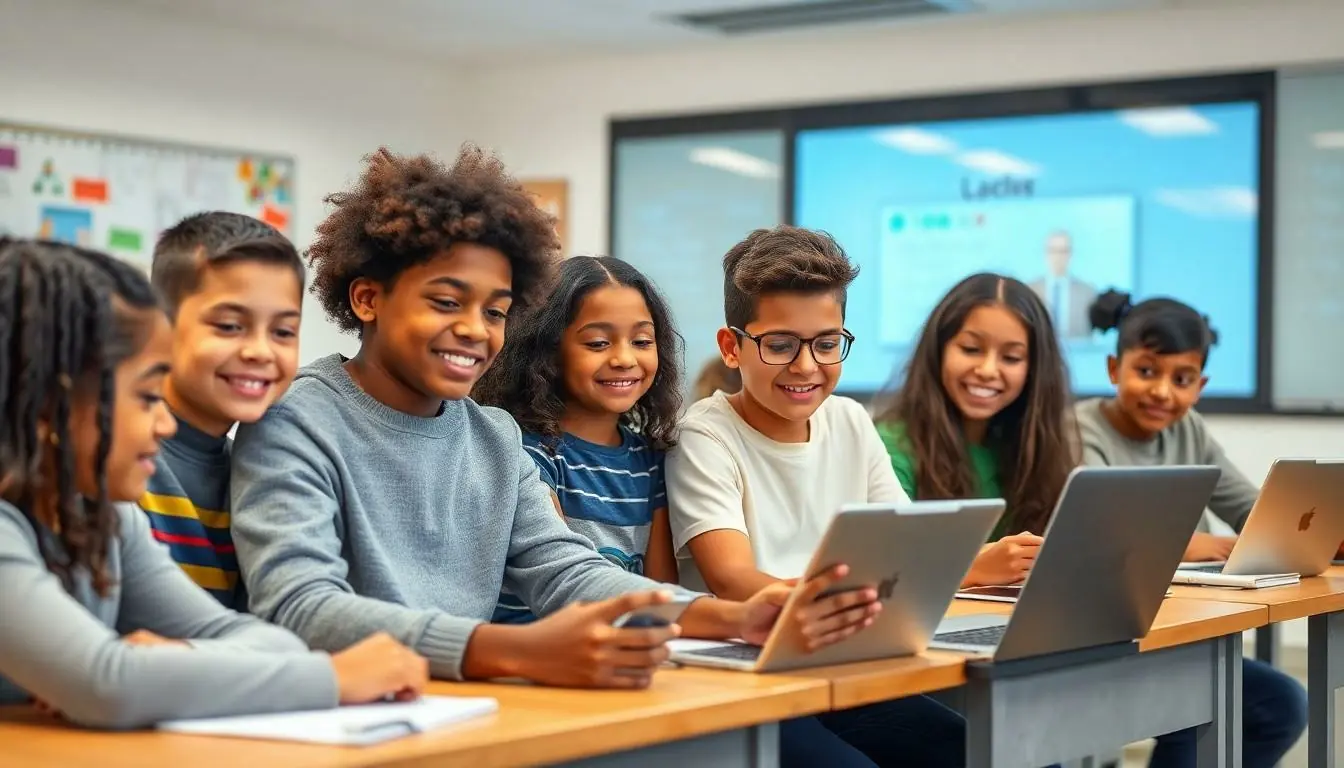Table of Contents
ToggleIn a world where textbooks are giving way to tablets, edtech innovations are rewriting the rules of learning. Gone are the days of dull lectures and endless note-taking. Today’s classrooms buzz with interactive platforms and gamified lessons that make education feel more like a thrilling adventure than a chore.
Imagine students mastering complex subjects while battling virtual dragons or collaborating on projects with peers halfway across the globe. These innovations not only engage but also empower learners to take charge of their education. With technology as their trusty sidekick, students are discovering that learning can be as exciting as binge-watching their favorite series.
Overview of Edtech Innovations
Edtech innovations significantly enhance the learning experience by integrating technology into education. Interactive platforms replace traditional textbooks, allowing for dynamic engagement. Gamification strategies motivate students through game-like elements, making learning enjoyable.
Innovative tools like virtual reality (VR) and augmented reality (AR) create immersive experiences that simulate real-world scenarios. Such experiences stimulate critical thinking and problem-solving skills. Furthermore, personalized learning environments adapt to individual student needs, promoting self-paced education.
Online collaboration tools enable students to work together across geographical boundaries. These platforms encourage teamwork and communication skills, essential for the modern workforce. Data analytics systems track student progress, providing educators with insights to tailor their teaching methods.
Artificial intelligence (AI) applications facilitate intelligent tutoring systems, offering immediate feedback and support. Adaptive learning technologies adjust content based on real-time performance, ensuring that each student receives appropriate challenges.
Mobile learning applications bring education to students’ fingertips, allowing learning anytime and anywhere. These applications encourage resource accessibility and flexibility in education.
Collectively, these edtech innovations lead to more inclusive learning environments. They bridge gaps for students with diverse learning needs, ensuring equitable education opportunities. Edtech continues to evolve, promising to transform educational landscapes further.
Key Trends in Edtech Innovations

Edtech innovations are reshaping education, making learning more engaging and accessible. Key trends include artificial intelligence integration and personalized learning platforms that adapt to student needs.
Artificial Intelligence in Education
Artificial intelligence (AI) plays a crucial role in modern education by enhancing teaching methods. AI-powered tools analyze student performance, providing real-time insights for educators. Intelligent tutoring systems offer customized feedback, allowing learners to progress at their own pace. Many institutions now utilize AI chatbots for 24/7 student support, addressing inquiries promptly. As AI technology advances, it continues to refine instructional strategies, fostering a more tailored learning experience.
Personalized Learning Platforms
Personalized learning platforms adapt educational content to meet individual student needs effectively. These platforms utilize data analytics to assess strengths and weaknesses, enabling targeted lessons. Learners can choose topics, pace, and study methods, creating autonomy in their educational journey. Adaptive learning technologies adjust material based on performance, ensuring comprehension before moving forward. This trend promotes inclusivity and engagement, making education more effective for diverse learning styles.
Impact of Edtech Innovations on Learning Outcomes
Edtech innovations significantly enhance student learning outcomes through various interactive technologies. Integrating platforms such as gamified lessons fosters increased motivation among students. Engaging with elements like virtual reality or augmented reality creates immersive experiences that stimulate critical thinking. These technologies help learners approach complex subjects with a new perspective, promoting deeper understanding.
Personalized learning environments adapt to individual student needs. Many platforms utilize data analytics to assess strengths and weaknesses, enabling educators to tailor lessons. Self-paced education encourages autonomy, allowing students to progress according to their capabilities. Online collaboration tools promote teamwork, enhancing communication skills that are essential in a globalized workforce.
Data analytics systems actively track student progress. Educators gain valuable insights into performance trends, allowing them to modify teaching strategies effectively. Artificial intelligence enhances this process with intelligent tutoring systems that provide customized feedback on demand. Some AI tools also include chatbots, which offer 24/7 support to address student questions.
Flexible mobile learning applications offer convenience, ensuring that education can occur anywhere, anytime. This flexibility allows students to learn on their own terms, increasing engagement. Inclusive learning environments reduce barriers for diverse learners, providing equitable opportunities for all.
Overall, edtech innovations lead to a transformative educational experience. Advances such as personalized learning platforms and mobile applications make education more effective, catering to various learning styles. Implementing these technologies supports a future where education is accessible, engaging, and tailored to individual needs.
Challenges and Limitations of Edtech Innovations
Cost remains a significant barrier for many educational institutions. Schools and universities might struggle to secure adequate funding for comprehensive technology integration. Limited budgets can hinder access to advanced tools that enhance learning experiences.
Privacy concerns must also be addressed. Collecting and analyzing student data raises questions about safeguarding personal information. Educational institutions need clear policies that outline data usage and protection measures.
Teacher training presents another challenge. Many educators may lack the necessary skills to effectively integrate technology into their teaching practices. Professional development programs must focus on equipping teachers with relevant knowledge and tools.
Technical issues can disrupt the learning process. Connectivity problems or software glitches can lead to delays and frustration for students and educators alike. Investing in reliable infrastructure and support systems helps mitigate these risks.
Equity of access to technology remains a critical concern. Not all students have the same level of access to devices and internet connectivity. Bridging this digital divide is vital in ensuring that all learners benefit from edtech innovations.
Over-reliance on technology can result in decreased engagement. Some students may become distracted by digital devices, leading to diminished focus on learning objectives. Balancing technology use with traditional teaching methods fosters a more effective educational environment.
Finally, rapid advancements in technology can lead to obsolescence. New tools and platforms emerge quickly, potentially rendering existing resources outdated. Educational institutions must continually assess and update their technology to keep pace with innovations and maintain effectiveness.
Future of Edtech Innovations
Edtech innovations are poised to revolutionize the learning landscape further. Artificial intelligence, with its ability to analyze performance data, engages learners like never before. Intelligent tutoring systems provide tailored feedback, helping students progress independently. Gamification elevates educational content, making lessons enjoyable while promoting skill development.
Virtual reality and augmented reality technologies offer rich, immersive experiences that deepen understanding. Personalized learning platforms adapt resources, meeting each student’s unique requirements. Real-time data analytics will refine teaching strategies, ensuring educators can respond to student needs effectively.
Moreover, online collaboration tools break geographical barriers, fostering cooperation among learners worldwide. Technical advancements enhance communication skills, a vital component for success in the global job market. Flexible mobile learning applications will ensure educational access anywhere, anytime, supporting student autonomy.
Challenges persist in this evolving landscape. Budget constraints limit access to cutting-edge tools, creating disparities among institutions. Privacy concerns around student data collection necessitate stringent protection measures. Teacher training also remains critical, as many educators lack the necessary technology integration skills.
Inequitable access to devices and connectivity raises questions about fairness in learning environments. The reliance on technology can stifle engagement if not balanced with traditional teaching methods. Rapid technological shifts may outpace existing resources, urging institutions to consistently evaluate their tools for effectiveness.
Investments in these areas promise a future where education becomes more inclusive, engaging, and effective. The ongoing commitment to innovation will shape a dynamic learning experience for all.
Edtech innovations are reshaping the educational landscape by making learning more engaging and accessible. As technology continues to evolve, it offers exciting possibilities for personalized and immersive learning experiences. The integration of AI, gamification, and collaborative tools fosters a dynamic environment that caters to diverse student needs.
While challenges such as budget constraints and privacy concerns persist, the potential for transformative change remains significant. By prioritizing investments in technology and teacher training, educational institutions can bridge gaps and create inclusive learning spaces. Embracing these advancements promises a future where education is not only effective but also enjoyable for all learners.




